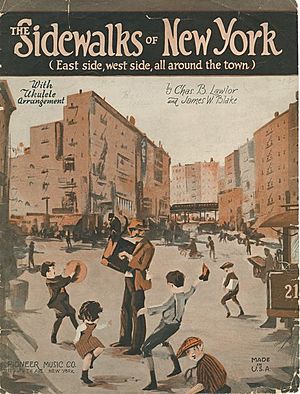The Sidewalks of New York facts for kids
"The Sidewalks of New York" is a very popular song about life in New York City during the 1890s. It was written in 1894 by a performer named Charles B. Lawlor and a lyricist named James W. Blake. The song became an instant hit and has remained famous, often seen as a theme song for New York City. Many artists, like Mel Tormé and Duke Ellington, have performed it. New York Governor Al Smith even used it as his campaign song when he tried to become president in the 1920s. The song is also known as "East Side, West Side" because those are the first words of its chorus.
Contents
About "The Sidewalks of New York"
This song paints a picture of what life was like for kids and families in New York City over 100 years ago. It talks about playing outside, singing, and dancing on the city's sidewalks. It reminds people of simpler times and the fun of growing up in a big city.
The Song's History
The song was created by Charles B. Lawlor, who was a vaudeville performer. Vaudeville was a popular type of entertainment with many different acts, like singers, dancers, and comedians. James W. Blake wrote the words for the song. When it came out in 1894, it quickly became a favorite. It has been loved by many generations of New Yorkers and people around the world.
Famous Lyrics
While some parts of the song might change depending on who sings it, the main part, called the chorus, always stays the same. Here are some of the original words:
Down in front of Casey's old brown wooden stoop
On a summer's evening we formed a merry group
Boys and girls together we would sing and waltz
While Ginnie played the organ on the sidewalks of New York
East Side, West Side, all around the town
The tots sang "ring-around-rosie," "London Bridge is falling down"
Boys and girls together, me and Mamie O'Rourke
Tripped the light fantastic on the sidewalks of New York
These lyrics describe kids playing classic games and dancing together, showing a lively and friendly neighborhood.
The Song in Movies and Commercials
"The Sidewalks of New York" has been used in many different ways over the years, from movies to advertisements.
In Films
- In 1923, a movie was made that was inspired by the song.
- The song appears in the 1934 Shirley Temple film Little Miss Marker.
- It is also heard in the 1934 movie Manhattan Melodrama. In this film, a band plays the song on a steamboat just before a sad accident happens.
- In the 1957 film Beau James, the mayor of New York City, played by Bob Hope, sings the song to show he understands the people of the city.
- More recently, a version by the band Blondie was used in the TV show The Deuce.
In Commercials and TV Shows
The song's tune has been popular for commercials because it is so well-known.
- In the 1950s, it was used for ads for Hot Shoppes restaurants. The jingle said: "East side, west side, all around the town/Wherever you look for a place to eat, a Hot Shoppes can be found."
- It was also used for Rheingold Beer ads with the words: "East side, west side, all around the town/Rheingold extra dry beer is the beer of great renown."
- In the mid-1950s, the song was part of a campaign to stop littering in New York City. A police officer sang about keeping the city clean.
- In 1960, a children's TV show host named Ed Bakey used the song as the theme for his clown character, "Tommy Seven." The lyrics were changed to be about watching his show.
- Even a taxi company called Scull's Angels used the song for a radio ad in the 1970s. The jingle talked about taking people "back and forth, and up and down" the city streets.


